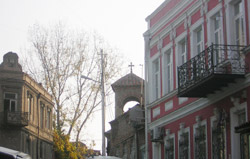Armenian-Georgian relations are not going so well. The debate on the churches still seems to be in the center of attention. During a conference on religion held recently in Tbilisi, the representative of the Armenian diocese raised the issue of providing the Georgia’s Armenian church with a legal status and spoke about the privatization of the Armenian churches carried out by the Orthodox Church.
Georgian scientific figures and the clergy gave bayonets to the speeches made. The Armenian diocese did not respond very well either. The debate has ended for a while, but that doesn’t mean end of story.
Well-known Georgian scientist and brilliant historian Marika Lordkipanidze is probably one of the few people that can give an objective point of view about the situation by keeping her cold heartedness. During one of her interviews given on Georgian television, she announced that since that issue has been brought up, a quick solution must be made. “Armenians have really had many churches in Georgia. But today we are talking about more than 600 churches which are supposed to be built by the Armenian community. This is an excessive amount. We ask the following question: where were the Georgians at that time? Without going into further details, I can say that some of the churches “listed” have really been built by Armenians and some of them by Georgians, but after a while, due to some circumstances, those churches have been under the supervision of Georgians. The issue is delicate and complicated; it needs to be studied and the issue must be solved rationally. The most important thing is for a third party not to be involved in this and heat things up,” said Lordkipanidze.
In this case, the “third power” is not phoniness if we take into consideration the situation in the Metskhet-Javakhk region where there are mainly Armenian residents. On December 11, the local residents broke the Georgian-Armenian customs and border barriers and showed their protest for violating their rights to trade freely and move from one place to another. Before that, there was a conflict in Akhalkalak between the people and policemen. The participants of the “border” conflict recall this event in their speeches. In their speech expressing their point of views, the participants claim that the Georgian authorities have forgotten about the promises they made to the public and they are leading a form of politics which is aimed towards violating the rights of the people when the people of the region are planning on raising the issue of autonomy. Attached to the speech was a letter directed to Mikhail Sahakashvili signed by a couple of veterans of the Karabagh war which mentiones the “pressure on Armenians in Javakhk.” I don’t want to draw attention to the fact that that region is internationally known as Javakhet and not Javakhk. What about that group of veterans? Doesn’t this mean interfering in the internal affairs of an independent nation?
If we look at the situation of the region objectively, we can see that it is improving. Despite the fact that they have many other issues to solve in other regions and not taking into consideration the predominance that they have over Abkhazia and Southern Osetia, the Georgian authorities however have directed the 300 million dollar grant provided by the U.S. towards reconstruction of the roads in Metskhet-Javakheti and improving communications. President Sahakashvili himself ordered that food for the army soldiers be bought in the region and the local administrative bodies are allowed to lead internal affairs in Armenian. This means that the situation in the country gets tense as soon as the central authorities of the country pay attention to the country’s problems and try to solve them in either a good or bad way. During an interview with “168 hours” correspondent, deputy of the Georgian parliament Van Bayburte announced that there are certain people who are trying to make the situation in Javakheti tense. We can not consider those people as phonies and we can suspect their political ties. A group of Georgian politicians look at this as Russia’s unique form of revenge, since it is afraid to lose its position in Southern Osetia. It is probably responsible for heating things up.
Executive director of the Southern Caucasus Institute for Regional Security (SCIRS) Alexander Rusetski believes that the situation can be controlled and in this stage and that it is not a cause for worry. “I propose organizing a meeting or conference with Armenian and Georgian political and scientific figures, clergy members, intellectuals and journalists in order to discuss and give solutions to some issues and, if you would like, a Georgian-Armenian center for studying relations between the two countries. It would be nice to see the Armenian side ask us to do this, for example, any NGO or political party. That could serve as a basis for cooperation,” said Rusetski to “168 hours”.
In this stage, when the authorities are keeping silent about the problem at hand and there is a danger that a third party may take advantage of that silence, the proposal made by SCIRS is pretty rational and should be drawn attention to…

